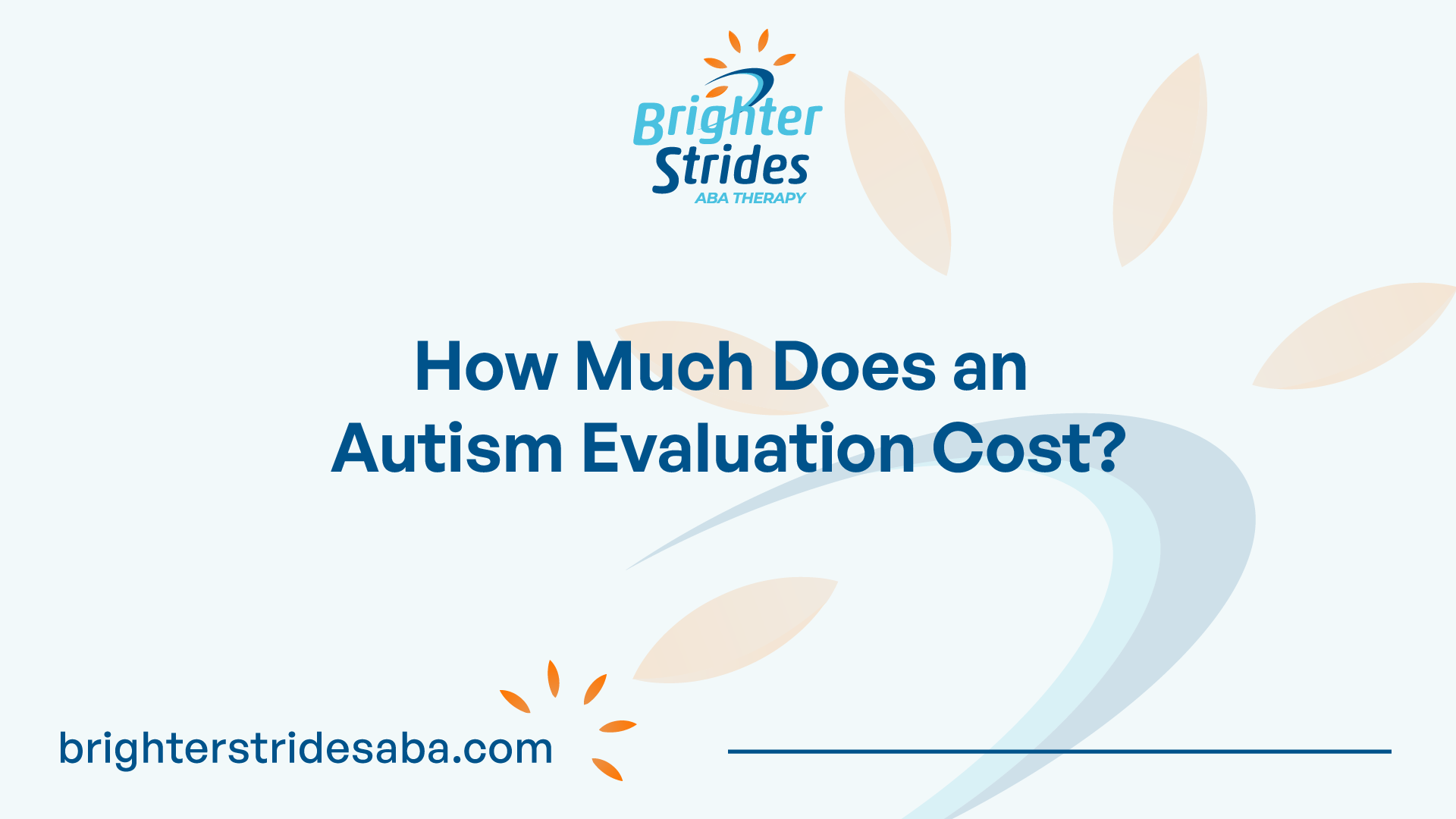Understanding Autism Evaluation Costs
When seeking an autism evaluation, it’s important to understand the costs associated with the process. The cost of an autism evaluation can vary depending on several factors, including location, healthcare provider, and the specific assessments and services involved. It’s essential to discuss the specific costs and services with the healthcare provider or clinic to understand what is included in the evaluation and associated fees.

Factors Affecting Evaluation Costs
Several factors can influence the cost of an autism evaluation. These factors may include:
- Location: Evaluation costs can vary based on the geographic location. For instance, evaluations conducted in urban areas may be more expensive compared to rural areas due to differences in overhead costs.
- Healthcare Provider: The expertise and qualifications of the healthcare provider can also affect the evaluation costs. Providers with specialized training and experience in autism evaluations may charge higher fees.
- Specific Assessments and Services: The specific assessments and services required during the evaluation can impact the overall cost. Different assessments, such as cognitive testing or speech and language evaluations, may incur additional charges.
It’s important to note that the factors mentioned above are not exhaustive, and individual circumstances may influence the evaluation costs.
Average Cost Range
The average cost of an autism evaluation can vary depending on the factors mentioned earlier. According to Cross River Therapy, the average cost of an autism screening and full evaluation ranges from around $1,000 to $2,000. However, as stated by ADInaba, the cost of an autism evaluation can range from $1,500 to $5,000, depending on various factors such as location, healthcare provider, and specific assessments and services involved.
To better understand the cost range, here is an approximate breakdown of the evaluation costs:
It’s important to keep in mind that these cost ranges are approximate and can vary based on the expertise and qualifications of the professionals involved, the location, and any additional services required. Discussing the evaluation costs with the healthcare provider or clinic beforehand will help provide a clearer understanding of the expenses associated with the evaluation process.
Understanding the factors that affect evaluation costs and the average cost range can assist individuals and families in planning for the financial aspects of an autism evaluation. It’s advisable to explore potential sources of funding, such as insurance coverage, Medicaid, and state programs, to alleviate the financial burden associated with autism evaluations.
Insurance Coverage for Autism Evaluation
When it comes to the cost of an autism evaluation, insurance coverage can play a significant role in alleviating the financial burden for individuals and families seeking diagnosis and related services. Many insurance plans do cover some or all of the costs associated with an autism evaluation, including diagnostic assessments and related services such as speech and language therapy and occupational therapy.
Coverage Considerations
Insurance coverage for autism evaluation varies depending on the specific insurance plan. It’s essential to review your insurance policy and understand the coverage details, including any limitations, copayments, or deductibles. Some insurance plans may require prior authorization or referrals from a primary care physician before initiating an autism evaluation.
To determine the extent of coverage, consider the following factors:
- In-Network Providers: Insurance plans often have a network of preferred providers. Seeking evaluations from in-network providers may result in higher coverage levels compared to out-of-network providers.
- Diagnostic Assessments: Insurance coverage typically includes the cost of diagnostic assessments conducted by qualified professionals, such as psychologists, psychiatrists, or developmental pediatricians.
- Related Services: In addition to evaluations, some insurance plans may cover related services such as speech and language therapy, occupational therapy, or behavioral therapy. Coverage for these services may be subject to specific requirements, such as medical necessity or predetermined limits.
- Age Restrictions: Insurance coverage may vary based on the age of the individual undergoing the evaluation. Some plans may have age limits for coverage or specific coverage guidelines for different age groups.
Medicaid and State Programs
For individuals who qualify, Medicaid and state programs can provide coverage for autism evaluations. The availability and extent of coverage vary by state. Medicaid programs typically cover diagnostic assessments and related services for eligible individuals, often based on income and other eligibility criteria.
Additionally, some states offer financial assistance, grants, or programs specifically designed to help offset the costs associated with autism evaluations. These programs aim to ensure that individuals have access to necessary evaluations and services without facing excessive financial strain.
It’s important to research and understand the specific Medicaid and state programs available in your location. Contacting local autism support organizations or resource centers can provide valuable information and guidance regarding available programs and eligibility requirements.
Navigating insurance coverage and government programs can be complex. It’s advisable to consult with an insurance representative or healthcare professional who specializes in autism evaluations to ensure you understand the coverage options and requirements specific to your situation. By leveraging available insurance coverage and financial assistance programs, individuals and families can navigate the cost of autism evaluations more effectively.
Financial Impact of Autism Evaluation
When considering an autism evaluation, it’s important to understand the financial implications it can have on families. The cost burden and long-term financial planning associated with autism evaluations are crucial aspects to consider.
Cost Burden on Families
The cost of an autism evaluation can vary depending on various factors, including location, type of evaluation, and the professional conducting the assessment. According to a study conducted in Western Australia, the median family cost of Autism Spectrum Disorders (ASD) was estimated to be AUD $34,900 per annum. It is important to note that nearly 90% of this cost, amounting to $29,200, was attributed to the loss of income resulting from employment.
Additional ASD symptoms can also contribute to increased costs for families. For each additional symptom reported, the cost for the family increased by approximately $1,400 per annum [2].
It is worth noting that there was no statistically significant difference in costs related to receiving the diagnosis of ASD immediately versus delayed. However, a delay in diagnosis was associated with an indirect increased financial burden to families.
Long-Term Financial Planning
The financial impact of an autism evaluation goes beyond the immediate cost. Families should consider the long-term financial planning needed for ongoing interventions, therapies, and support services. Early and appropriate access to early intervention is known to improve a child’s long-term outcomes and reduce lifetime costs to the individual, family, and society.
It is essential for families to explore available resources, such as insurance coverage and financial assistance programs, to help alleviate the financial burden associated with autism evaluations and ongoing care. Conducting thorough research and seeking guidance from professionals and support networks can aid in developing a comprehensive financial plan to support the needs of the individual with autism and their family.
Understanding the financial impact of an autism evaluation and planning accordingly can provide families with a clearer path to navigate the costs associated with diagnosis, intervention, and ongoing support. By being proactive and exploring available resources, families can better manage the financial aspects while prioritizing the well-being and development of their loved one with autism.
Provincial Funding Programs
When it comes to the cost of autism evaluations, the availability of funding programs can significantly impact families seeking diagnosis and support. In Canada, each province has its own approach to funding autism-related services and supports. In this section, we will explore the funding programs in British Columbia, Ontario, and Quebec.
British Columbia
In British Columbia, parents of children under the age of six who have been diagnosed with Autism Spectrum Disorder (ASD) are eligible to receive up to $22,000 per year, per child in support funding. This funding is administered by the Ministry of Children and Family Development. Additionally, funding for autism services was extended to children from their sixth birthday all the way through to their 19th. This extension created a second funding program, also administered by the Ministry of Children and Family Development [3].
Ontario and Quebec
In Ontario, families with children under the age of six can receive financial support through the Ontario Autism Program (OAP). Under this program, families are eligible to receive $20,000 annually per child. For families with children aged six and older, the funding amount is reduced to $5,000 annually per child.
In Quebec, autism services are grouped together with physical and intellectual disability programs and services. Unfortunately, there is a lack of dedicated funding for autism programs and resources in Quebec, resulting in long wait lists and fragmented services.
It’s important to note that each province in Canada has its own unique approach to funding autism evaluation and support services. The availability and extent of funding programs can vary widely, impacting families differently across the country. Provincial governments have the authority to change their approaches to funding, which can sometimes lead to conflict among those affected.
Understanding the funding programs available in your specific province is essential for families seeking autism evaluations. It is recommended to consult with local resources, advocacy organizations, and government agencies to stay informed about the latest funding options and support services available in your area.
Private vs. Public Assessments
When it comes to autism evaluations, families have the option of choosing between private and public assessments. Each option has its own advantages and considerations, including access, cost, and the assessment process itself.
Access and Cost Comparison
In some regions, such as British Columbia, families have the choice between a publicly funded assessment or a private assessment. Public assessments, available through organizations like Sunny Hill Health Centre for Children and the BC Autism Assessment Network (BCAAN), are free of charge but often come with a significant waiting period of 6-12 months. On the other hand, private assessments, such as those offered at Southpoint Development Clinic, provide the advantage of earlier evaluation and the ability to choose a specific clinician. However, families are responsible for covering the cost of the assessment. Many families have extended medical plans that can help with most or all of the expenses, making private assessments more accessible.
Assessment Process Overview
Private assessments for autism follow similar measures and assessment protocols as public assessments. Typically, the assessment process involves two appointments at Southpoint Development Clinic. The first appointment focuses on the parent component, gathering information about the child’s developmental history and concerns. The second appointment is dedicated to assessing the child or adolescent. In some cases, older youth who can handle longer sessions may complete the full evaluation in one day. During the assessment, various assessments may be administered, including speech-language and cognitive assessments for children under the age of 6 to provide a comprehensive overview of their developmental level. These additional assessments aid in making accurate diagnostic decisions and ruling out other conditions. For older children, additional assessments may be recommended but are not mandatory.
Following the assessment, the psychologist integrates the results with prior information to determine a diagnosis. This is followed by a feedback session with the family to discuss the results, recommendations, and any necessary paperwork for accessing funding and treatment services if the child is diagnosed with autism.
In summary, private assessments offer families the ability to select the clinician who evaluates their child or teen, allowing for a more customized approach to the assessment process. While families are responsible for the cost of the assessment, extended medical plans often provide coverage, making private assessments a viable and accessible option for timely evaluation and intervention services.
Affordable Evaluation Options
When it comes to autism evaluations, there are affordable options available for individuals with limited financial resources. These options aim to ensure that everyone has access to the necessary evaluations, regardless of their financial situation. Two such options include community resources and financial assistance programs.
Community Resources
Community resources play a crucial role in providing affordable autism evaluations. These resources can vary depending on location and may include non-profit organizations, community clinics, or university research programs. These entities often offer evaluations at lower costs or on a sliding scale fee basis, taking into account an individual’s income or ability to pay.
By accessing community resources, individuals can receive comprehensive evaluations from qualified professionals at a reduced cost. These evaluations are crucial for obtaining an accurate diagnosis and developing appropriate intervention strategies.
Financial Assistance Programs
Financial assistance programs are another avenue for accessing affordable autism evaluations. These programs are designed to provide support to individuals with limited financial resources, helping them cover the costs associated with evaluations. Some of the available options include:
- Insurance Coverage: Many insurance plans cover the cost of autism evaluations. It’s important to review your insurance policy to understand the extent of coverage and any limitations or requirements.
- Government Programs: Some government programs, such as Medicaid in the United States, offer coverage for autism evaluations. These programs aim to make evaluations more affordable and accessible to individuals who may not have private insurance.
- Grants: Various grants and funding opportunities may be available to help offset the cost of autism evaluations. These grants can be obtained through non-profit organizations, government agencies, or foundations dedicated to supporting individuals with autism.
It’s essential to explore the available financial assistance programs in your area to determine eligibility and the specific requirements for accessing support.
By utilizing community resources and financial assistance programs, individuals with limited financial resources can access affordable autism evaluations. These options help ensure that no one is denied access to vital evaluations due to financial constraints. Whether it’s through reduced-cost evaluations provided by community resources or financial assistance programs, these options strive to make the evaluation process more accessible and affordable for all individuals seeking an autism diagnosis.
References
- https://www.crossrivertherapy.com/autism/evaluation-and-screening-costs
- https://www.ncbi.nlm.nih.gov/pmc/articles/PMC4156354/
- https://aidecanada.ca/resources/learn/financial/under-18-supports
- https://www.autismontario.com/programs-services/oap-service-navigation
- https://www.autisme-montreal.com/en/autism-montreal/links.html#funding
- http://southpointdc.com/autism-spectrum-disorder/




